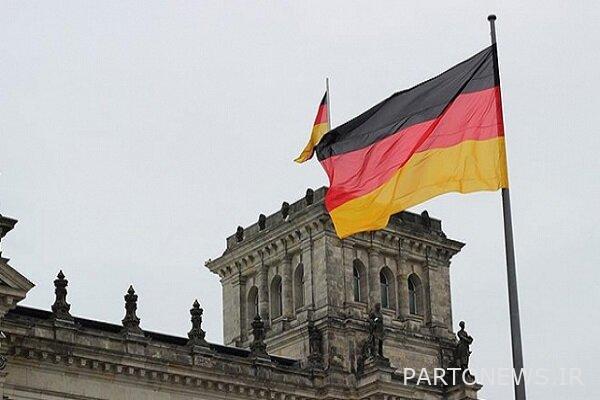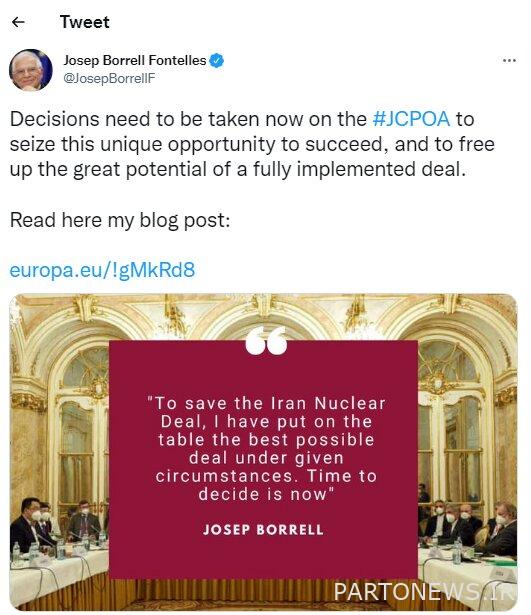The position of the German ambassador in Tehran after the publication of the “Borrell” memo – Mehr News Agency | Iran and world’s news

According to Mehr News Agency, the German Embassy in Iran published a message without mentioning the continued inaction of the European Union after the unilateral withdrawal of the United States from the JCPOA (along with the violation of UN Security Council Resolution 2231) in 2018 on its Twitter account. “Hans-Udo Muzel”, the ambassador of this country in Tehran, wrote: Now is the time to save the JCPOA.
“Hans-Edo Motsel” further claimed: Let’s all support the compassionate request of Josef Borrell, in charge of EU foreign policy. It is the joint responsibility of all of us to revive this agreement. Now is the time to decide!
On the other hand, “Joseph Burrell”, the head of the European Union’s foreign policy, wrote on his Twitter account today, without referring to the continued inaction of the European Union after the unilateral withdrawal of the United States from the JCPOA (along with the violation of UN Security Council Resolution 2231) in 2018: Decisions must be made now regarding the JCPOA in order to use this unique opportunity to succeed and unleash the great potential of the full implementation of this agreement!

The official of the European Union’s foreign policy also wrote in his note published on the European Union’s website: 7 years ago, 5 permanent members of the United Nations Security Council, Germany, Iran and the High Representative of the European Union for Foreign Affairs and security policy, they concluded an important diplomatic agreement. The Joint Comprehensive Plan of Action (JCPOA) was the result of more than a decade of intensive diplomacy on Iran’s nuclear program and was approved by all members of the United Nations Security Council. This agreement required significant political will to be concluded in 2015, especially in the final months of the negotiations.
“Joseph Burrell” claimed in this regard: I am proud of the role that the Europeans played in creating this nuclear agreement! European diplomatic engagement goes back to 2003; When the foreign ministers of France, Germany, and Britain traveled to Tehran for the first time to discuss nuclear concerns with Iran. Javier Solana, former EU foreign policy representative, joined them in 2004 and in 2006, he managed to get all members of the Security Council to support this effort. Our goal was always to conclude an agreement that would benefit everyone. That is, for the benefit of Europe, for the benefit of Iran and for the benefit of the world community that we all achieved. We concluded the JCPOA in July 2015, implemented and preserved it!
In this regard, he added: The full implementation of the JCPOA led to a 98% reduction in Iran’s enriched uranium reserves and the removal of thousands of centrifuges. The full implementation of the agreement was heavily influenced by Donald Trump’s decision in 2018 to withdraw the US from it and pursue a unilateral “maximum pressure” campaign.
This European official claimed without referring to the continued inaction of Brussels regarding its commitments to the JCPOA: The European Union and all the remaining participants in the JCPOA very openly opposed the withdrawal of the United States and the reimposition of sanctions! We did this publicly, individually, collectively and multilaterally at the United Nations!
Without referring to the few months of Tehran’s strategic patience against the breach of promises and the violation of the Security Council Resolution 2231 by the western side of this agreement and then acting based on Articles 26 and 36 of the JCPOA, he announced: Iran, on the other hand, nuclear activities It has reached alarming levels. Unfortunately, Tehran has also limited its oversight of the International Atomic Energy Agency, while failing to fully cooperate with the agency under its basic safeguards obligations!
The European Union’s foreign policy official stated: Maximum pressure (Trump’s administration) failed; Because the collective unity of the participants kept this agreement alive and now it is more important than ever to continue this work (keeping the JCPOA).
Joseph Borrell acknowledged: Despite the best efforts of the remaining participants (in the nuclear deal), including the unique and voluntary European initiative INSTEX aimed at facilitating legal trade with Iran, the withdrawal of the United States will significantly harm the interests of the United States. It reduced the economic expected for Iran. This is the reason why JCPOA could never bring its full capacity to the fore. Meanwhile, the people of Iran have been deprived of the full benefits of the lifting of sanctions. We also understand this.
He pointed out: In order to reverse the process of this dangerous escalation, as the JCPOA coordinator and based on UN Security Council Resolution 2231, I started a diplomatic process in April 2021 with the presence of JCPOA participants and the United States. Its purpose was to facilitate the return of America to the agreement and the full implementation of the obligations of Iran and America in the JCPOA!
This European official wrote: Now I have put a text on the table that deals with the cancellation of sanctions and also the nuclear steps needed to restore the JCPOA in detail. This text represents the best possible agreement that I, as a negotiator, find possible. Now is the time for urgent political decisions to end the Vienna negotiations on the basis of my proposed text and quickly return to a fully implemented JCPOA.
This is while the Joint Comprehensive Plan of Action (JCPOA) was signed in 2015 by the 5 permanent members of the UN Security Council and Germany on one side and Tehran on the other.
It should be noted that after a few months have passed since the continuation of a new round of negotiations to lift anti-Iranian sanctions, the United States is still hindering its effectiveness.
Doha talks were held on July 7 and 8 this year. In these negotiations, Iran and the United States discussed indirectly with the mediation of “Enrique Mora”, the deputy in charge of foreign policy of the European Union.
After this meeting, the deputy in charge of foreign policy of the European Union explained the results of the two-day negotiations in Doha regarding the lifting of anti-Iranian sanctions.
“Enrique Mora” wrote in a Twitter message: Two days of intense and indirect negotiations in Doha regarding the JCPOA. Unfortunately, the progress that the EU team had hoped for as a coordinator has not yet been realized. We will continue to work with greater urgency to get the key non-proliferation agreement and regional stability back on track.
It should be mentioned that after a 3-month hiatus, negotiations to lift the sanctions began in Doha, Qatar, with the presence of Iranian and American representatives, with a bilateral meeting between Ali Bagheri, the chief negotiator of the Islamic Republic of Iran, and Enrique Mora, the coordinator of the negotiations.

